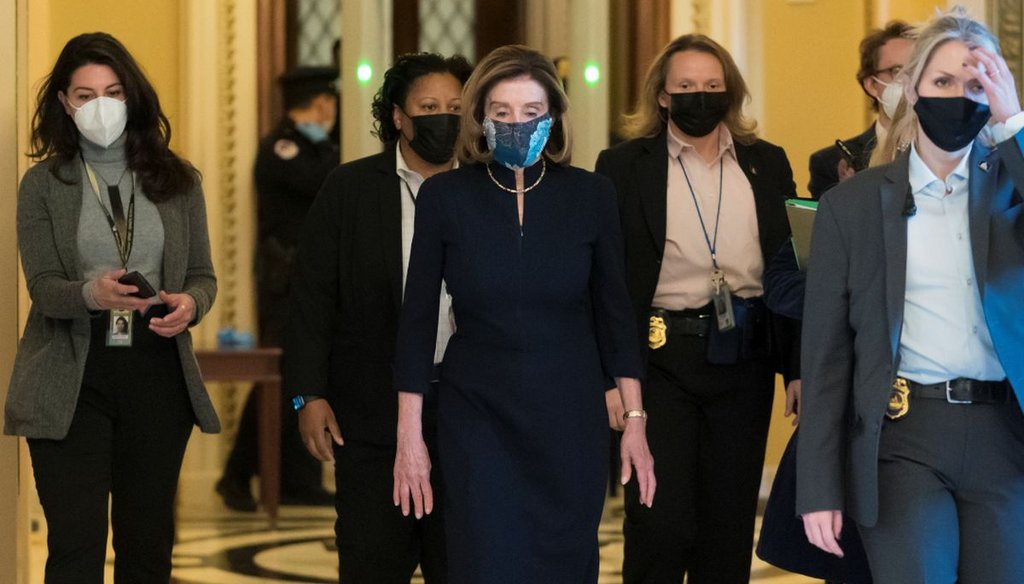Stand up for the facts!
Our only agenda is to publish the truth so you can be an informed participant in democracy.
We need your help.
I would like to contribute

House Speaker Nancy Pelosi, D-Calif., returns to her leadership office after opening debate on the second impeachment of President Donald Trump on Jan. 13 2021. (AP)
If Your Time is short
• With the House voting to impeach President Donald Trump, the action moves to the Senate. It is not immediately clear when the Senate will begin a trial.
• Most experts say that a trial can proceed after Trump is out of office if needed. If so, the main action would revolve around whether to bar Trump from holding public office in the future.
• There are ways the Senate could structure its business so that a trial and other types of work, such as confirming incoming President Joe Biden’s nominees, can proceed on a parallel track.
A week after supporters of Donald Trump stormed the Capitol — and one week before the inauguration of a new president — the U.S. House of Representatives impeached Trump for a second time.
Trump is the only president to be impeached twice in U.S. history, and 10 Republicans joined Democrats in approving the measure by a 232 to 197 margin.
The article of impeachment cited Trump’s false claims about the election results, including at the rally of his supporters on Jan. 6. By having "incited" the crowd, the article said, Trump "gravely endangered the security of the United States and its institutions of government. He threatened the integrity of the democratic system, interfered with the peaceful transition of power, and imperiled a coequal branch of Government."
The next step in the impeachment process is a trial in the Senate. That can’t begin until the House formally presents the articles to the Senate. Impeachment is a "privileged" resolution, which means that the Senate must take it up in place of other pending business.
A group of House members, known as managers, serve the role of prosecutors in the Senate. Pelosi has already chosen them, with input from her caucus. The Democratic-controlled House formally votes to approve the list. Trump is free to choose his own defense team who will represent him in the Senate proceedings. This team will play a role analogous to defense attorneys.
Democrats are in something of a bind because the impeachment trial would eat up time at the beginning of Joe Biden’s presidency. That could delay the staffing of Biden’s Cabinet and other urgent business the new administration would like to pursue.
As the impeachment was being debated, an aide to Senate Majority Leader Mitch McConnell told reporters that he would not cooperate in a quick trial. If that position holds, then the trial wouldn’t take place until Biden is inaugurated — and after Trump is out of office.
Waiting until Biden is in office would also allow Vice President-elect Kamala Harris to break ties in the Democrats’ favor, handing more power to Senate Democratic Leader Chuck Schumer, D-N.Y.,to set the agenda without McConnell’s cooperation.
So whether Pelosi sends over the paperwork immediately, or delays it to give the Senate time to consider Biden’s Cabinet nominees, the trial would come after Trump leaves office.
Here’s what else we know about what follows the House’s historic vote, which was taken at legislative warp speed.
Can the Senate hold a "late" trial?
The ability to hold a trial after the impeached official has left office isn’t a sure thing, but there’s historical precedent and a credible legal argument for making it happen, experts say.
While the constitutional text "is unclear, the history underlying it is not," Brian Kalt, a law professor at Michigan State University, wrote in a 2001 paper on the subject. "Late impeachment was practiced in England and, unlike other aspects of English impeachment, was never explicitly ruled out in America."
In fact, at the time of the Constitutional Convention in 1787, "a late impeachment was raging in London, and state constitutions addressed the issue and allowed them," said James Robenalt, a lawyer and expert on impeachment.
The precedent in the United States involves a case from 1876, when Secretary of War William W. Belknap resigned just hours before the House impeached him on bribery charges. The Senate went ahead with the trial anyway and acquitted him on Aug. 1, 1876.
There’s also a practical reason for holding a trial of an impeached former official: The Senate can, and often has, taken a second vote after conviction on barring the individual from ever again holding public office. A trial and conviction would need to be held before that second vote could be held.
"In the spirit of the impeachment clause, late impeachment provides a way to punish wrong-doing by an officer late in his or her term of office," despite some constitutional uncertainty, said Steven Smith, a Washington University in St. Louis political scientist.
How would a trial work?
The current Senate rules for impeachment have been in force since 1986. This version relies heavily on rules that went back to the impeachment trial of President Andrew Johnson in 1868.
Senators who want to question witnesses must put their query into writing. The votes are cast in public. In some cases, witnesses have been allowed to testify by recorded video rather than in person.
It’s important to note, however, that the rules can be modified. It would take 51 votes to change the rules, assuming all members are present. (Under the rules, filibusters are effectively barred.)
In other words, a motivated majority of senators with leadership support could strip down the procedure required before a vote to remove the president is taken.
Per constitutional mandate, Chief Justice John Roberts presides over the trial. But he is not an all-powerful force, as a bare majority of senators can overrule him.
The presiding chief justices in Johnson’s impeachment and Bill Clinton’s tended to be deferential to senators rather than ruling the trial with an iron fist, and Roberts acted similarly a year ago during Trump’s 2020 impeachment trial.
What’s needed to convict and remove a president?
Two-thirds of senators, or 67 if all are present, are required to remove the president. Until recently, getting two-thirds of Republicans to impeach Trump was unimaginable.During Trump’s first impeachment just a year ago, only one Republican, Sen. Mitt Romney of Utah, voted to approve an article of impeachment.
This time, convicting Trump would still be a heavy lift, but it would not be impossible. Much depends on what position McConnell takes.
So far McConnell has sent contradictory signals: He has indicated he may be open to removal, but not while Trump is in office. If that bears out, it’s not inconceivable that he could bring along 17 Republicans with him. That’s the number needed after the two recently elected but not yet certified Democrats who won Senate races in Georgia are seated.
Sens. Lisa Murkowski, R-Alaska, and Pat Toomey, R-Pa., have called on Trump to resign, and Sen. Ben Sasse, R-Neb., has said he’ll consider voting for impeachment.
What other votes could be taken?
If the Senate were to vote for Trump’s conviction, an even more significant vote could follow. The Senate could vote to bar Trump from ever holding public office again.
This vote would take just a simple majority. And if Trump is convicted by a two-thirds vote, thus enabling the second vote, then it’s hard to envision the vote to bar him from office failing to pass as well.
In the past, the Senate has used a simple majority vote to bar three people, all federal judges, from holding office.
Can the Senate do other business while it handles an impeachment trial?
On Jan. 11, Biden said he had the "hope and expectation" that the Senate could handle a trial and other legislative business at the same time — such as confirming his Cabinet appointees. Experts said this is possible, though it would require some extra steps.
"The Senate can meet in legislative or executive session on the same calendar day as it meets for a trial," Smith said. This means that when the trial is underway, senators can’t simply engage in other business. However, they could pause the trial and go into a different type of session to handle other matters.
What would happen to Trump's pension and Secret Service protection if he's removed?
If Trump were to be removed from office before his term ends, then he would automatically lose his lifetime pension. His Secret Service protection would remain intact. But being removed from office before his term ends may not be in the cards.
Most of the benefits afforded presidents were passed in 1958 as part of the Former Presidents Act. An annual lifetime pension of about $200,000 and annual travel allowance of up to $1 million are enumerated in the law, which says those benefits apply to presidents "whose service in such office shall have terminated other than by removal pursuant to section 4 of article II of the Constitution of the United States of America." That section spells out the process by which a president may be removed from office. The penalties don’t apply if Trump leaves the presidency without a Senate conviction.
Meanwhile, a 1962 law provides Secret Service protection for former presidents, at their request, "for a reasonable period after he leaves office." Congress would have to pass a separate law to revoke Trump’s Secret Service protection.
RELATED: Fact-checking a viral post about impeachment and Trump’s post-presidency benefits
Our Sources
Article of impeachment against Donald Trump, Jan. 12, 2021
CNN, "Pelosi statement naming impeachment managers," Jan. 12, 2021
New York Times, "McConnell is said to be pleased about impeachment, believing it will be easier to purge Trump from the G.O.P.," Jan. 12, 2021
Washington Post, "Romney’s not really alone. Republican senators were ready to oust Nixon in 1974," Feb. 12, 2020
PolitiFact, "The second Trump impeachment: Questions and answers," Jan. 11, 2021
PolitiFact, "What’s next after Trump’s impeachment?" Dec. 18, 2019
































